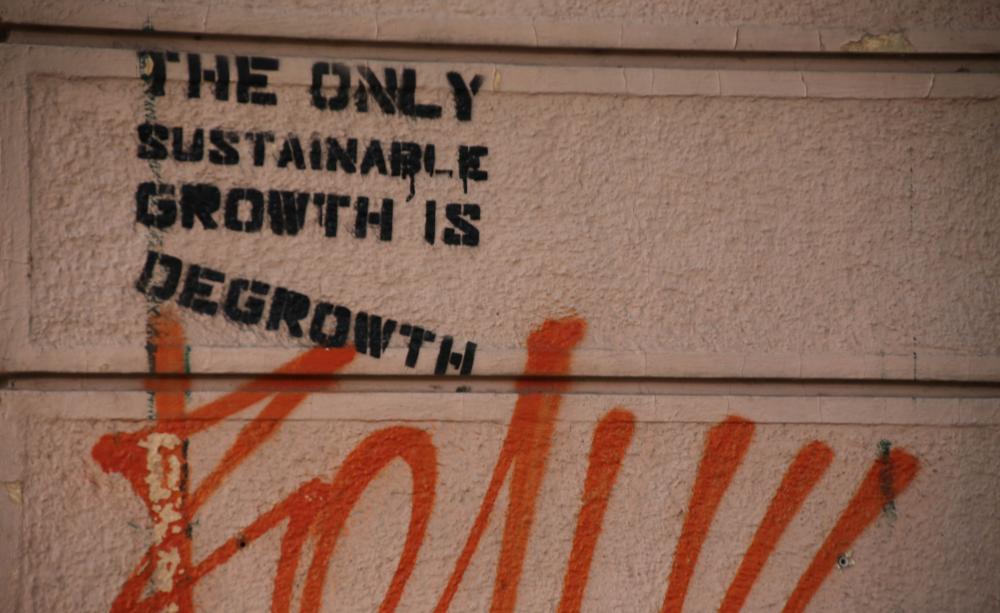Photo credit: “The only sustainable growth is degrowth”, June 8, 2014, by Paul Sablemann via Flickr Volume 3, No. 5 | Op-Ed
“Faster, higher, further” – is the economic and social paradigm that was implemented into our brains decades ago. Whether it is national economic expansion or personal development, we were taught that we have to grow in order to be successful. While the Club of Rome predicted already in 1972 in his report “Limits to Growth” that endless growth is not possible on a planet with finite resources, today we can see where our constant strive for more is taking us: Climate change is about to really kick in with burning forests, extreme weather and consequently a significant loss of biodiversity and agriculture worldwide. Moreover, economic growth not only comes at ecological, but also at social costs, such as increasing income inequality and challenges to our health.
This is what made some people finally question if growth is really good and necessary and led to the movement of “degrowth”. Degrowth advocates say that in order to live within the Earth’s limits we have to dramatically reduce our energy and material use by producing and consuming less stuff. Now, many will argue that consuming less goods and services will negatively affect people’s well-being and that we need economic growth in order to overcome inequality. But in fact it can be the other way round: degrowing our richest economies could not only save the planet but can actually benefit people’s well-being and solve even some of our social problems.
To be distinguished from recession, “degrowth” means a planned and controlled contraction of the world’s richest economies to get back in line with the planetary boundaries (Assadourian, 2012). As Serge Latouche, one of the leaders of the movement, explains, it “does not mean decay or suffering […] instead degrowth can be compared to a healthy diet voluntarily undertaken to improve a person‘s well-being” (Assadourian, 2012).
Talking about diets, developed nations would certainly not suffer from a little loss of weight. Obesity is just one example of the results of overconsumption and it imposes a serious health problem to many industrial countries (Assadourian, 2012). According to the Center for Disease Control and Prevention, nearly 40% of US citizens were obese in 2016. They suffer from a lower quality of life and problems like heart disease, diabetes and cancer, which may even affect the next generation. Therefore it would be in their personal interest to reduce the obsessive consumption of food in order to gain their quality of life back. In addition, this could also help to slow down the ongoing excessive agricultural production, presenting another threat to the environment.
Furthermore, less production of goods and services would also mean less work for us. In fact, “degrowthers” even call for a reduction in working hours and welcome a four-day-work week. Working less to save the planet, sounds nice doesn’t it? According to an analysis from the University of Massachusetts, Amherst our carbon footprint would be reduced by 14.6%, if we spend 10% less time working. Hence, a full day off a week would reduce it by almost 30%. However, the reduction of working time should not result in an overall increase in productivity or wages as this would outweigh the earlier achieved emissions reductions. To make sure that people don’t compensate these by using their day off to follow carbon-intensive activities, like going shopping or flying for a short holiday, it would be necessary to also reduce their incomes.
Clearly this is not a very popular measure. But since any degrowth scenario would require some kind of wealth distribution from the rich to the poor, a Universal Basic Income (UBI) could be the solution to this. After all it’s the top earners who produce the most emissions, and not the average worker. According to Oxfam, half of all global carbon emissions are caused by the world’s richest 10% while the poorest 50% of the population only cause 10% of emissions (BBC, 2019). With the UBI, the problem of income inequality could be diminished as well and without economic growth. The state would pay the same to everyone in the society so that basic needs can be satisfied, such as healthcare, housing, education and transportation.
Working less, earning less and consuming less can therefore be good for the environment and for the people, as long as incomes are distributed equally and basic needs can still be satisfied. This way, a reduction of working hours can also benefit many people who are suffering from the consequences of overwork. Stress and burnout have become an increasing phenomenon over recent years and the most common sources include work, money and health (Elflein, 2019). In Japan, people work so many hours, there even exists a word for “death by overwork”: karoshi.
All of this is alarming and shows us that the constant strive for more money and more consumption, that comes with the perpetual pursuit of economic growth, is in fact not benefitting the personal well-being of people in developed countries, it even worsens it to some extent. Therefore we should stop thinking in competitive terms, that more is always better.
Instead, we should stop overconsuming the planet’s finite resources and be satisfied with what we have – bearing in mind that there are still so many people out there struggling to satisfy even their most basic needs. Given the extent of ecological overshoot and social injustice, there might be no alternative to solve this problem than to downscale resource and energy demands in the richest nations. Therefore I encourage people to be more open to degrowth and to acknowledge the benefits this concept can have, for our planet and for every member of the global society.
References
- Smedley, T. (2019), How shorter workweeks could save earth, published in BBC Worklife 101. Retrieved from: https://www.bbc.com/worklife/article/20190802-how-shorter-workweeks-could-save-earth
- Elflein, J. (2019), Stress and Burnout – Statistics and facts. Retrieved from: https://www.statista.com/topics/2099/stress-and-burnout/
- CNN Library (2019), Obesity in the US fast facts. Retrieved from: https://edition.cnn.com/2013/09/02/health/obesity-in-u-s-fast-facts/index.html?no-st=1573397802
- Perryer, S. (2019), Cutting back: How the degrowth movement could save the planet, published in EuropeanCEO. Retrieved from: https://www.europeanceo.com/lifestyle/cutting-back-how-the-degrowth-movement-could-save-the-planet/
- Assadourian, E. , (2012), The Path to Degrowth in Overdeveloped Countries, World Watch Institute. Retrieved from: https://www.researchgate.net/publication/283415624_The_Path_to_Degrowth_in_Overdeveloped_Countries?enrichId=rgreq-4be6304486d62164ec44a76a78c02711-XXX&enrichSource=Y292ZXJQYWdlOzI4MzQxNTYyNDtBUzozNDc3MDYzOTc2MDk5ODRAMTQ1OTkxMTA3MzU4NQ%3D%3D&el=1_x_2&_esc=publicationCoverPdf












































I liked your article it was very easy to read and the structure made sense.
I totally agree with you that we have to do alot more to stop the destructive influence of mankind on our planet but I am not sure if degrowth is the right way. In theory it sounds nice but how do you want to execute this plan and what could be the consequences?
It think its going to be almost impossible to find a global agreement on this idea, some governments, for example the Chinese, justifies their whole political system with constant economic growth and the constant improvement of their citizens lives.
Economic growth helped to reduce absolute poverty in many countries and furthermore, I think it is the human genes to always strive to improve their personal situation and standing still in terms of economic development would certainly not be an easy situation for most people.
It was very hard for the world community to find solutions for way smaller problems in the past so I have no hope that this could happen now for this big problem.
Another problem would be to ensure everyone is following the new system. What if people don’t want to and act in their old ways? Do you want to put them in jail?
Would democracy still be the right political system for this future?
I believe that mankind should dramatically improve their scientific research for an alternative energy source or technological improvements that help to reduce the CO2 emission to zero.
For me this approach seems more realistic than to convince all countries to follow the “degrowth” idea.
Dear Lennart,
I understand your doubts about the concept of degrowth and it is clearly a big challenge to convince governments, who lead their country on the basis of economic growth, to stop encouraging consumption and production. This is because they follow the old models of economic development where everything is about exponential growth, the more the better, faster higher further etc..But there are also new ways to improve the lives of people and develop economically and socially, but where everything happens in moderation, so that future generations or the environment do not have to bear the costs. One example is the Philosophy of a Sufficiency Economy, which was proposed by the deceased King of Thailand, Bhumibol Adulyadej , and it was already successfully implemented and reduced poverty in parts of Northern Thailand. It is not exactly degrowth but similar to it, as degrowth promotes sufficiency as well, and could be used as a role model especially for developing countries.
I was also asking myself the question how we should convince people to change their behaviour and if this might require a new political system. I certainly don’t want to have an autocratic regime that forces everyone to reduce their consumption and put them in jail if they don’t follow. Instead of using “sticks” to make people change their behaviour, we should therefore try to convince them with by showing them how they can as well benefit from degrowth and as soon as people understood that there will be movements to also make governments change their policy. I mean this is already happening if we look at Fridays for Future etc.
A bottom-up approach like this is needed and also compatible with democratic systems.
And yes this is a huge challenge, but we have to start to address the problem at its cause and stop putting all our trust in advanced technologies. There already exist many alternatives and we already have the right tools, but we are not using them in the right way. The efficiency gains are outweighed by increased consumption, as I tried to show in the article. We can continue developing advanced technologies and doing research for ever, but if we don’t change the way we use and consume them, there’s no way we can address the environmental crisis in a serious way.
I really enjoyed to read your article about such an important topic that concerns all of us. I think every single person should think about and become more open to the concept of “degrowth”. It is very simple to understand that boundless economic growth which is intrinsically tied to a limitless increase in comsumption is incompatible with a planet that offers finite resources. When we look at our modern society, I often think myself that we possess so many things that we don’t even need. Consuming more and more is addictive because nothing really makes you happy anymore and you strive all the time for more and more things. The earlier generations lived happy lifes with a lot less than we do, so an ongoing increase in consumption is not necessary for personal well-being. I totally agree with you that is has advantages for the global society if everyone could just be satisfied with less and would live a more natural life. I think this would actually lead to an increase in satisfaction and happiness. There have already been movements that encourage people to reuse all different of commodities and it is in fact incredible what you can make out of things that seem useless and that most of the people throw away. So I think it is necessary to draw even more attention to this topic and to convince people that life is not worth living because of consumption. I hope that all the advantages on the envrionment, the health and the society will in the end convince many people. And I do not see a reason why a democratic political system would interfere with this idea.